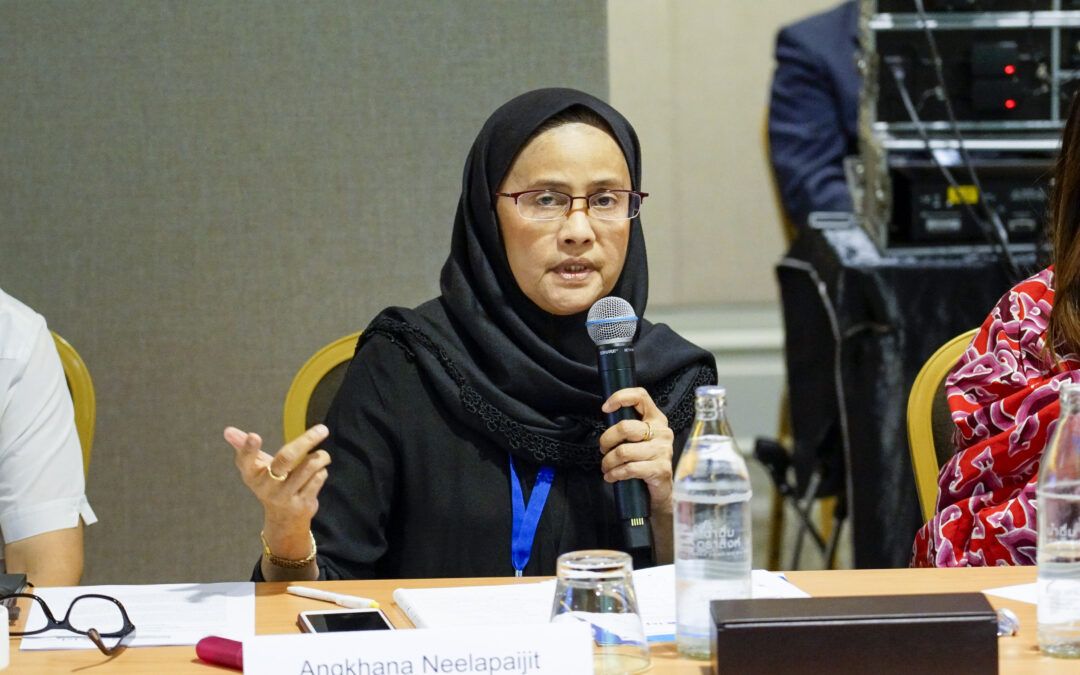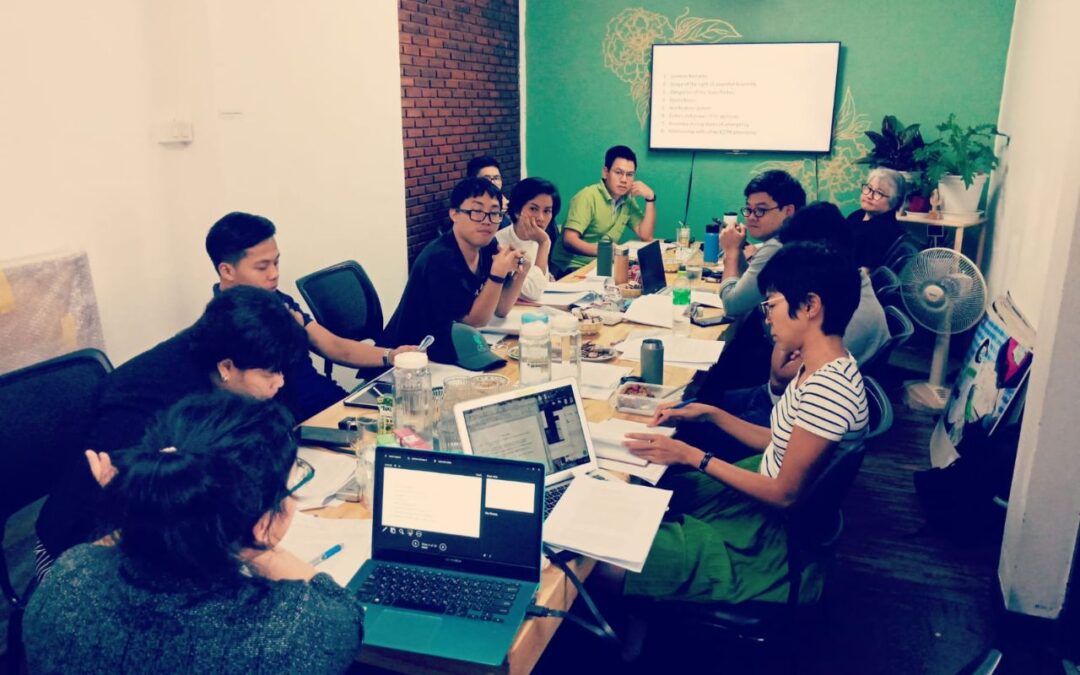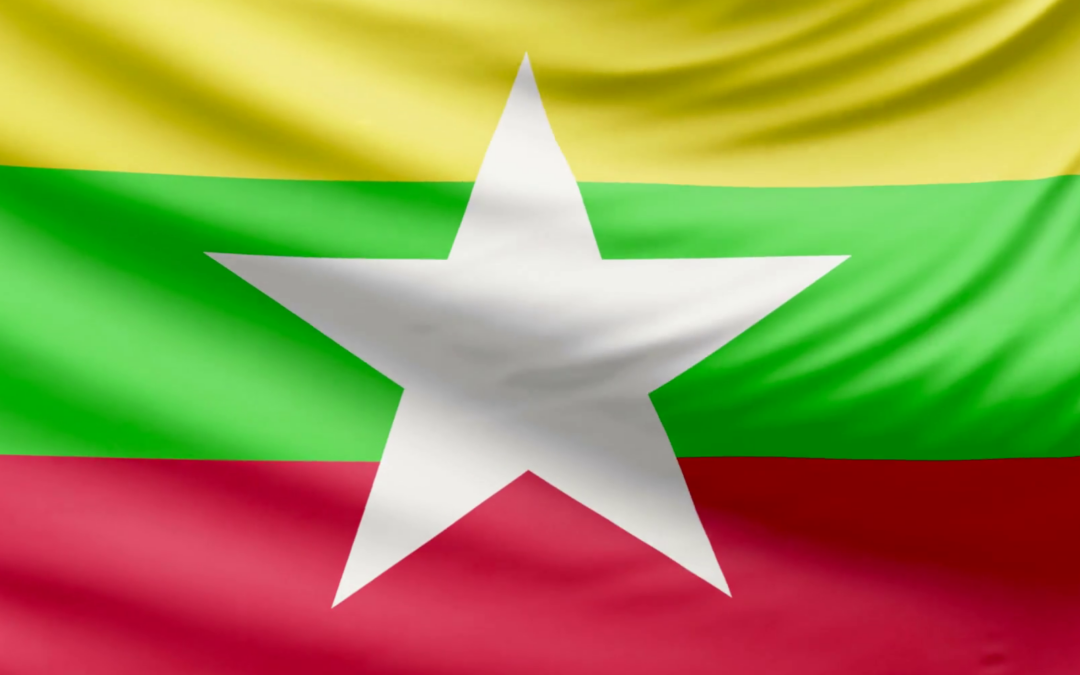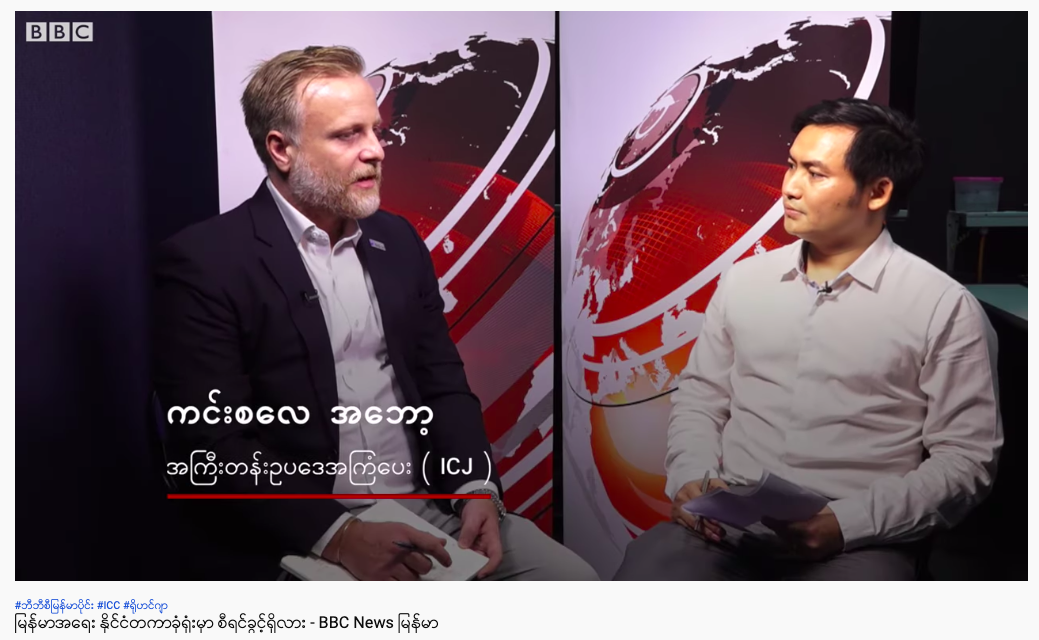
Nov 27, 2019 | News
Today, the ICJ condemned Thammakaset Co., Ltd’s use of the criminal defamation provisions of the Thai Criminal Code to harass former National Human Rights Commissioner Angkhana Neelapaijit.
“This action by Thammakaset is a textbook case of how defamation laws are used in Thailand to silence human rights defenders. It is clearly without any legitimate basis, and intended to harass and intimidate Khun Angkhana, who is a leading champion of human rights in Thailand and the region,” said Frederick Rawski, ICJ Asia Pacific Regional Director. “We hope that the Courts will dismiss this frivolous case at first opportunity.”
On 25 October 2019, Thammakaset Co. Ltd., a poultry farm in Lopburi Province, filed a criminal defamation suit under sections 326 and 328 of the Criminal Code against Angkhana Neelapaijit for two posts she shared that contained links to press statements of 16 organizations, including the ICJ, and Fortify Rights.
The statements cited in the warrant as the basis for the action were a post on 3 December 2018 in which Angkhana Neelapaijit re-tweeted an ICJ link to a joint statement co-signed by 16 organizations, including the ICJ. The statement contained a link to a short film in which former employees spoke out about alleged labor abuses; and a post on 28 June 2019 which included a link to a Fortify Rights’ news release containing the same link. The film refers to a previous defamation complaint brought by Thammakaset against 14 of its former workers, and called upon the authorities to drop criminal defamation charges against them and decriminalize defamation in Thailand. Thammakaset claimed that the film was defamatory.
Criminal defamation, under sections 326 of the Criminal Code, carries a maximum sentence of one year of imprisonment, a fine of up to 20,000 Baht (approx. USD 640) or both. Section 328 criminalizes defamation “by means of publication” with up to two years’ imprisonment and a fine of up to 200,000 Baht (approx. USD 6,400).
Thailand is party to the International Covenant on Civil and Political Rights (ICCPR), which guarantees the right to freedom of expression. The UN Human Rights Committee, the supervisory body that provides the authoritative interpretation of the ICCPR, has called on States that criminalize defamation to abolish criminal defamation laws and reserve defamation for civil liability.
“The criminal defamation provisions in the Criminal Code have been repeatedly invoked for nefarious ends, such to target persons seeking to bring public attention to human rights violations, including by business enterprises. They need to be removed from the Criminal Code as a matter of urgency,” said Rawski. “The imposition of criminal penalties for speech, even allegedly defamatory speech, is disproportionate and risks having a ‘chilling effect’ on the exercise of freedom of expression.”
Further reading
Thailand: Drop defamation complaints against human rights defenders Nan Win and Sutharee Wannasiri
Thailand: ICJ and LRWC submit amicus in criminal defamation proceedings against human rights defenders Nan Win and Sutharee Wannasiri
Contact
Frederick Rawski, ICJ Asia-Pacific Director, t: +66 64 478 1121; e: frederick.rawski(a)icj.org
***
Download the press-release with additional information in English and Thai. (PDF)

Nov 27, 2019 | Advocacy, News
On 26 November 2019, the ICJ, jointly with the Centre for Civil and Political Rights (CCPR Centre), hosted a round-table discussion on the right to peaceful assembly in Thailand. The discussion was held at the office of Thai Lawyers for Human Rights (TLHR).
Fifteen lawyers, members of civil society organizations and academics attended the discussion.
The discussion began with an introduction to the UN Human Rights Committee’s draft General Comment No. 37, which when revised and adopted will constitute an authoritative interpretation of the right to freedom of peaceful assembly, as guaranteed under article 21 of the International Covenant on Civil and Political Rights (ICCPR). Thailand is a State party to the ICCPR.
The UN Human Rights Committee – the body mandated to interpret and supervise the implementation of the ICCPR – made the draft General Comment available for all stakeholders to review between November 2019 and 14 February 2020. The Committee in its draft considers the obligations of States parties in respect of such right to peaceful assembly, including permissible limitations and duties and powers of law enforcement agencies.
During the meeting, participants discussed about Thailand’s existing law governing the exercise of the right to peaceful assembly – including the 2017 Constitution of the Kingdom of Thailand and the 2015 Public Assembly Act. The discussion also focused on comments on the draft General Comment that the participants may submit to the UN Human Rights Committee, and advocacy strategies to strengthen Thailand’s legal frameworks once the draft General Comment is adopted by the UN Human Rights Committee.
Participants identified challenges posed by in the implementation of certain domestic laws, particularly the Public Assembly Act, which may result in unnecessary and disproportionate restrictions on the right to freedom of peaceful assembly in Thailand. These included the lack of a clear definition of “an assembly”; identification of “no-go” zones for protestors; problems arising from the use of notification systems where a failure to notify the authorities of an assembly was used as basis to render participation in the assembly unlawful and for dispersing the assembly; and overbroad powers delegated to authorities to impose conditions for assemblies regulating the time, place and manner of assemblies.
At the meeting’s conclusion, participants considered ways of provided input on the draft General Comment to the UN Human Rights Committee. They also strategies to work to bring existing Thai laws in compliance with international laws and standards that regulating the right to freedom of peaceful assembly.

Nov 25, 2019 | Advocacy, News
The ICJ held a two-day workshop on 23-24 November 2019 in Mandalay on the application in Myanmar of international law and standards on freedom of religion and belief. Some 40 participants from across the country, including human rights defenders, religious leaders and lawyers who work on issues of freedom of religion or belief, attended the event.
The two-day workshop was conducted in order to provide a safe platform for participants to discuss pressing issues concerning the right to freedom of religion or belief (FoRB) in Myanmar, with a particular focus on protecting places of worship. It allowed participants to share challenges encountered in their spheres of activity and explore ways to address state regulations that disproportionately impact minority religions.
ICJ Associate Legal Adviser Jenny Domino introduced the international standards on FoRB applicable to Myanmar, including how FoRB affects other human rights such as the right to freedom of expression. She discussed the different constitutional approaches to protecting FoRB in Myanmar and the Philippines, and presented the applicable international standards relevant to the protection of places of worship in conflict settings. ICJ Legal Researcher Dr Ja Seng Ing shared the legal and practical challenges to protecting places of worship in Myanmar.
Based on their own independent research, the participants discussed restrictions placed on the practice of religion or belief, particularly with respect to places of worship. The participants shared challenges they encountered while working on FoRB issues, such as the shrinking civic space for inter-religious dialogue. They also discussed possible strategies to push for legislative and administrative reform to protect FoRB in Myanmar.
The workshop is part of the ICJ’s ongoing effort to convene civil society actors and lawyers in Myanmar with a view to advancing FoRB in the country, and builds on the ICJ’s regional work on this theme.
Contact
Ja Seng Ing, ICJ Legal Researcher, e: jaseng.ing(a)icj.org
Related material
Challenges to freedom of religion or belief in Myanmar, A Briefing Paper, October 2019
Primer on international human rights law and standards on the right to freedom of thought, conscience, religion or belief, January 2019

Nov 14, 2019 | News
On 14 November 2019, the ICJ called on the Government of Cambodia to drop apparently politically-motivated charges of treason against Kem Sokha, leader of the now-defunct Cambodia National Rescue Party (CNRP).
The ICJ also called on the government to remove restrictions on the exercise of fundamental freedoms of all individuals in Cambodia.
On 10 November, Kem Sokha was released from court-imposed conditions amounting to house arrest, following his arrest in 2017 on spurious charges of treason under article 443 of the Criminal Code. This came after Phnom Penh Municipal Court partially lifted the judicial supervision conditions to which Sokha had been subject. He remains banned from participating in political activities and from leaving Cambodia, and must respond to summons from any authority. Charges of alleged “conspiracy with a foreign power” remain active against Sokha, pursuant to which he risks being imprisoned for between 15 and 30 years.
“Although the release of Kem Sokha from house arrest is a welcome development, it is not nearly enough to show that the government is committed to ending its persecution of civil society and political rivals,” said Frederick Rawski, ICJ’s Asia Pacific Director.
The release comes just after the European Commission released a preliminary report outlining the findings of an investigation triggered in February 2019 on possible removal of tariff preferences granted to Cambodia under the ‘Everything But Arms’ (EBA) trade agreement, on the basis that the Cambodian government had failed to comply with its international obligations to respect, protect and fulfil human rights and the rule of law. A fact-finding mission completed by the Commission last year found ongoing serious, systematic violations of human rights in Cambodia, particularly of the rights of free expression, association, assembly and political participation. In February 2020, the European Commission will finalize its decision.
“The fact that the charges remain in place, and Kem Sokha’s rights to freedoms of association, expression and the right to political participation continue to be suppressed is further evidence of an overall dire human rights and rule of law environment in Cambodia,” said Rawski.
Cambodia has seen a sharp deterioration in human rights and the rule of law since before the 2018 general elections, which has seen abuse of legal and judicial processes to harass and silence members of the political opposition, civil society, and independent media.
Members of the political opposition have been targeted in recent months. In 2019 alone, Cambodian authorities have charged more than 100 members of the political opposition with offences for political reasons, and detained more than half of them. The Cambodian government has also attempted to ban the return of opposition members in exile by urging neighbouring governments to stop their movement into Cambodia, and through increased monitoring of border crossings. In October 2019, the ICJ and other organizations also called for the dropping of spurious charges against former Radio Free Asia (RFA) journalists Yeang Sothearin and Uon Chhin, who are being tried for multiple offences in connection with carrying out their journalist functions.
Background
The charges against Kem Sokha appear politically-motivated. His arrest in 2017 came just months before the CNRP – the main opposition party which he led – was dissolved, and more than 100 of its members banned from political activity following a Supreme Court judgment in November 2017. Soon after, the ruling Cambodian People’s Party won the July 2018 general elections by a landslide. The ICJ has highlighted that the “single largest problem facing the Cambodian justice system is the lack of independent and impartial judges and prosecutors”, including “an endemic system of political interference in high-profile cases and an equally entrenched system of corruption in all others”.
Contact
Frederick Rawski, ICJ Asia and Pacific Regional Director, e: frederick.rawski(a)icj.org
See also
ICJ, ‘Cambodia: charges against journalists Yeang Sothearin and Uon Chhin must be dropped’, 4 October 2019
ICJ, ‘Misuse of law will do long-term damage to Cambodia’, 26 July 2018
ICJ, ‘Cambodia: weaponization of the law (UN Statement)’, 22 March 2018
ICJ, ‘Cambodia: the ICJ condemns dissolution of main opposition party’, 16 November 2017

Nov 13, 2019 | Advocacy, Multimedia items, Video clips
In a video interview with the BBC’s Burmese broadcasting service, ICJ senior legal adviser Kingsley Abbott explains to the Myanmar public how the International Criminal Court prosecutor plans to investigate the crime against humanity of deportation from Myanmar to Bangladesh, which has affected around one million Rohingya.
Recorded on 24 August and published on 12 November 2019. The interview transcript is available in Burmese and English.
Contact
Kingsley Abbott, ICJ Senior Legal Adviser, e: kingsley.abbott(a)icj.org









